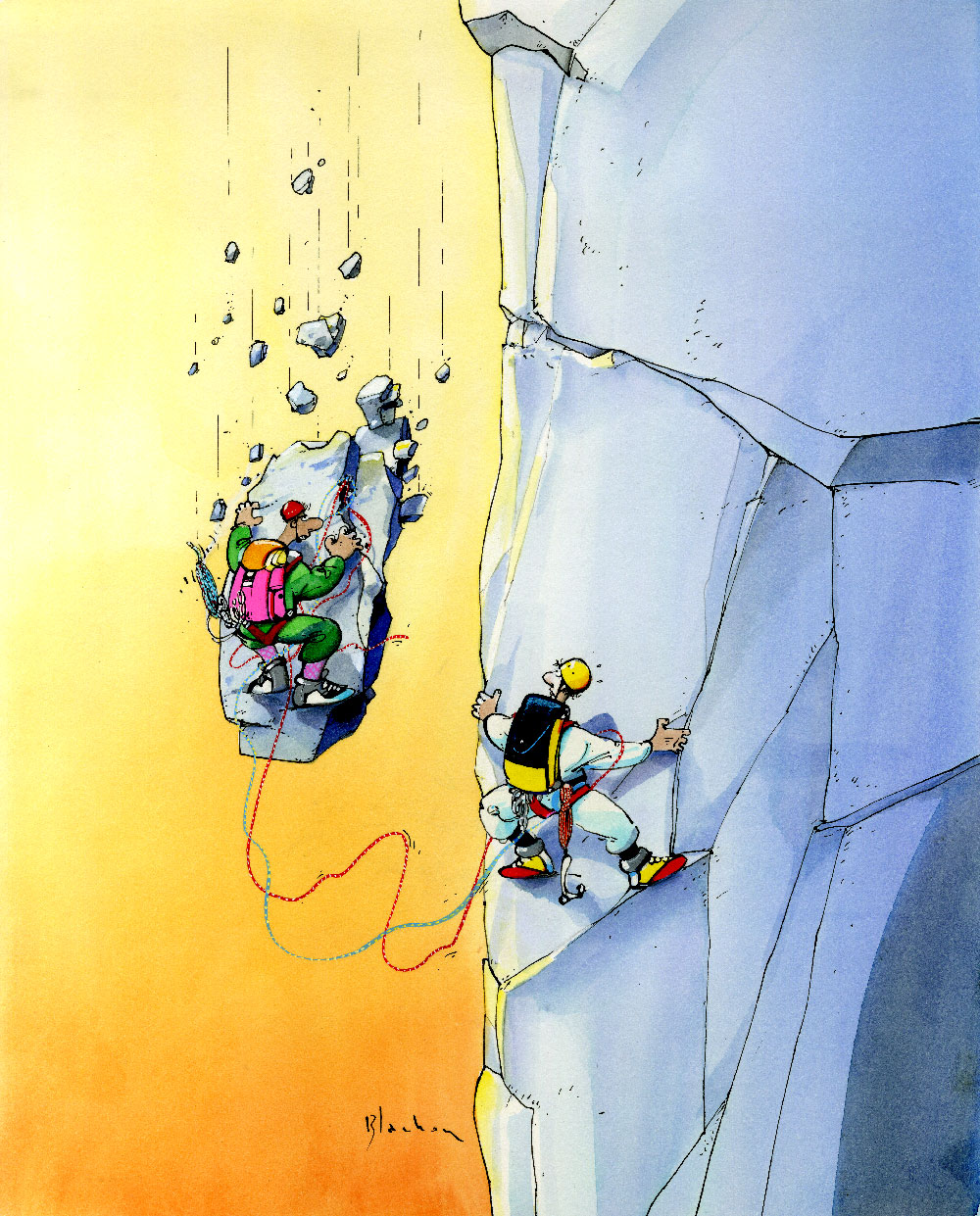

copyright:M. Blachon

WO: Is there one thing you’ve taken from sports that you use today in your job as school principal and a member of the school team?
Michał: I think that team work and the rules that govern a team – these experiences taken from sports help me in my job. They teach me how to plan tasks when managing a team of a few dozen teachers, coaches, a really big team with various problems that come up from time to time. I remember how roles were created in the teams I used to be a part of, how the coach solved problems, or how the team members solved problems on their own, even though they had different views on various matters. You come across strange individuals both in sports and in business, and you need to know how to deal with them. The way the whole team works is definitely crucial.
WO: What is the team’s role in winning? Do we win and lose together, as a team?
Szymon: Precisely! We win together and we lose together. I hate it when a coach says “we won”, but if the team loses he uses the words “they lost”. At the end of the game the coach gets a medal as well. So I believe that if we win together we also lose together. Everyone needs to remember this from the very beginning. Players need to be shown that they are one team, they need to be treated as a team.
Kuba: A team needs a coach, a team needs a leader, a leader needs a team. Coaches don’t win and lose on their own. In basketball we say that if a team loses by twenty points, the team lost. If a team loses by one point, the coach lost, it’s the coach’s responsibility, because a coach is there to contribute that one winning point if the two teams are on the same level.
WO: On the other hand in sports it’s the stars that count. During one interview Stephane Antiga said that the national team is a team made up only of stars, and that this is also a challenge. When you have a team like that how can you reinforce the belief that the ego comes last? Often you “play a specific player”, there are big names in soccer, basketball, or volleyball.
Kuba: Stars are necessary to drive the others. These are the people young players dream of becoming, they are their role models.
WO: But this is someone outside the team, a role model to look up to and try to copy. But what is the role of a star on a team?
Tomek: I never played on a team with a star. We’re talking sports, but let’s be open here and say it all boiled down to me playing professionally, but making only about 200 złoty a month playing for Zgierz. In the NBA every player is a star. In high school they were probably already the most popular students, and then they joined a team where maybe one person made a million dollars while someone else made fifteen, yet they were all very rich and they were all stars. And that is where the problems start, because they all have big egos – but even though they all make lots of money, the problems are the same as on any other team: the coach didn’t let me play, someone didn’t pass the ball. The role of the coach is to put the pieces of the puzzle together in such a way as to make the whole picture work.
Kuba: I think that even on a team like the national team you can say someone is a star and the other players will not have an issue with that if that person proves that “stardom” on the playfield and during practice. If in a group of twelve of the best players in a given country there are two who, during a match on the world cup or Olympic level, take the responsibility and can prove themselves, others on that team, even though they are all stars, will accept the fact that even in an all-star team there are leaders.
WO: So we’ve now come to a team where there are a few stars, and each one is – in their personal opinion – better than the others. Some are better, some worse. According to your experience what motivates players on a team more – playing with those that are better than they are, or those that are worse?
Szymon: We faced this exact dilemma in basketball. We have forty boys in the high school and sometimes we send those who could play in the first team to play in the second because we believe it will be better for their personal development and growth. It’s better to play on a weaker team than sit on the bench with a stronger team. We are focused on long-term growth, so we make these decisions, even though they are often met with great disappointment and questions from parents as to why we do this. They say “you recruited my son to play” – and that is exactly the point, we want him to play.
Tomek: In my opinion playing with better players always means that the weaker player has to try harder, go a level higher. So as far as sports development goes, it is better to play with those who play better than us. But this is always an individual decision and the coach has to make the call – he has to know who he will motivate to play better, and who will be blocked by the knowledge that another player is better. One player plays better when he is praised, while another is motivated by criticism and yelling because they then think “I will show him, I’ll score thirty points to spite him” – and this also develops a player. The coach needs to know who has a personality that needs to be praised, and who needs a “kick”. It’s also a matter of personality.
WO: Do you ever come across players who are helpers when it comes to the development of others, informal leader of sorts who say “play like this, do that”? Or does everyone play only for themselves, even though they are on a team?
Szymon: In volleyball, in the Krótka Piłka Association, there are kids from second and third grade in elementary school who you can look at and immediately see they will be leaders. So far I have come across two such cases – I watch them grow and develop, I observe how they behave on the team, how young people – because they are very young – can cheer for their friends on the playfield. I once had two four-player teams who played at the same time, with a cap of fifteen points. On one team a boy, whom I had not spoken to earlier, took a time out and started talking to his friends. I asked “Kowal, what happened?” and he said “Coach, we were winning 13:9, but all of a sudden it was 13:12, so I took a time out”. I just stared and left him alone. I can see he’s a leader, he’s developing so well and motivating his friends, he’s taking responsibility, and observing his growth and attitude is such a pleasure. But these things happen very rarely. I’ve worked with the Association for three or four years and over these years there have been only two boys who at such a young age were fantastic leaders.
We spoke as a team:
Michał Feter – principal of the Gortat School in Łódź for the last 4 years. Previously, for 10 years Michał worked as a coach and management advisor (including project management), and was responsible for obtaining outside funding for projects, evaluation, and coach competencies. He is the author of over 200 grant projects. From an early age he has been fascinated by sports. Spain is his hobby.
Szymon Nowak – occupational therapist, teacher and publicist by education, who has been active in volleyball all his life. He loves working with people and for the people. Before joining the Gortat School he worked for the Dziewczynka z Zapałkami and JiM Foundations. At the School he is responsible for marketing and for the growth of the volleyball project. Coordinator of the Gortat School Business Club. He does what he loves by working in the field of sports.
Tomasz Solarek – graduated from Łódź University with a degree in English. Used to play basketball for ŁKS and Łódź University. Worked for 7 years for the Marcin Gortat MG13 Foundation, where he was responsible for coordinating the Marcin Gortat Camp project. Currently works for the Gortat School and Gortat School Business Club. Responsible for collaboration with American colleges to provide sports scholarships in the U.S.A. for Gortat School students.
Jakub Urbanowicz – graduated from the Łódź University of Technology with a degree in Management. Used to play basketball for ŁKS and and the Łódź University of Technology. Responsible for the development of Marcin Gortat Schools in Łódź, Kraków, Poznań, and Gdańsk. Co-creator of the Gortat School Business Club. President of the ŁKS Male Basketball Association.
Waldek Olbryk – Believer in the development of organizational culture through working on aspects that can influence it, based on the client and user perspective. Believes in the concept of “life-long learning”. Loves the P2P (people2people) approach in everything that is related to business – even in the area of pure B2B (business2business). Open to exchanges between cultures and sectors. Created the concept and co-organized discussions between artists, businessmen, and academics organized at the SOUNDEDIT 2017 festival in Łódź. Admitted to the Royal Society for the Arts, Manufactures and Commerce in 2018. Currently works as Board Member of Echo Investment S.A. For over 20 years he has been active in the real estate sector in Poland, working for companies such as BP, Apsys, Philips, and Skanska.
Look for others inspirations, interviews? Go for p2v